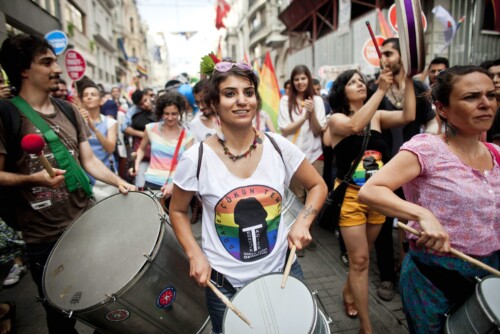Conclusions
Contemporary controversies surrounding the advancement of SOGI as the basis for human rights claims echo early debates about the geopolitical boundedness of a fledgling global movement. Dynamics within the movement have undoubtedly changed. The growing activist presence in the global south has challenged many assumptions underlying early discussions. The internet, the global AIDS crisis, the regionalization of ILGA’s structure and emergence of other global actors advancing sexual rights have to some extent leveled access to information and resources, although the selection mechanisms of global civil society (organizational capacities; the ability to speak English, etc.) still reinforce disparities among and within national movements and reproduce longstanding tensions.
My intention here is not to suggest sexual rights activism or even LBGTI politics or identities are inherently white, neocolonial or middle-class. As I have discussed elsewhere, 1 like other institutional or discursive constructions, these can be appropriated in ways that allow stretching, reinvention and resignification. In their articulation with larger modernizing projects, however, they do seem to carry some pretty heavy baggage. The weight of this baggage, and the contestation surrounding it, were suggested early on, in a report on the III IGA Conference written by the Jamaican delegate Larry Chang:
In real terms, our participation at this conference amounts to little more than tokenism. The benefits to us from my experience and from the contacts I have made will be immeasurable and far-reaching indeed. But until more women and non-white people are included, IGA and, by extension, the international gay liberation movement will continue to be dominated by the concerns of gay white males. Fortunately, many delegates were aware of this imbalance and reference was made to it throughout the conference. This was expressed in many forms: dissatisfaction with the structure and organization of the conference itself; the patriarchal attitude of the host organization; attacks against sexism, classism and racism. It all boils down to gay white male supremacy reflecting that of the wider world. 2
Nor is my intention here to reify boundaries between north and south or between the West and the Rest. If anything, Mascarenhas’s analysis illustrates how such constructed binaries can be incorporated into national discourses and drawn internally, within societies, in ways that are situationally relevant to national polities and terrains of cultural contestation. Within the international movement, as within the Brazilian movement, his was one voice among many. And his discursive appeal to a Western modernity was one strategy of engagement with this reified binary but not the only one. In other post-colonial contexts, much as Buist envisioned in his paper, activists have countered the common inscription of sexual and gender variance outside the imagined nation both by reclaiming local and precolonial expressions of such variance as an extension of projects of decolonization — over and above a transnational discourse framed around LGBTI identities and rights — and by highlighting the entanglement of dominant constructions of tradition with the colonial projects they purport to reject, such as inherited antisodomy legislation. Either course speaks to the hold that such reified binaries retain in a sexual politics playing out in the context of persistent power asymmetries.
A final conclusion might be drawn about the appeal to “local initiative” in international solidarity efforts, as reflected in ILGA’s policy that it will provide “locally initiated and determined support” to organizations. Local contacts are important, but “local contacts” can also be a legitimizing frame. My discussion above underscores the ultimately partial and situated position of local activists within movements and points to the need for a careful mapping of local movements and political realities to gain a full understanding of how outside actions may intervene quite specifically in local-level, including local-movement-level dynamics.
- Ibid. [↑]
- Larry Chang, “Report of the International Gay Association Conference,“ May 25, 1981, International Resource Network – Caribbean Region, http://dloc.com/icirngfm.[↑]


